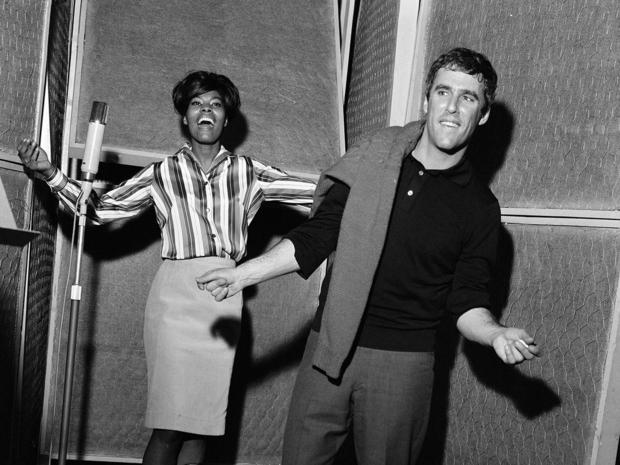Celebrating the smooth sound of Burt Bacharach
In 1968, Jonathan Tunick was a young orchestrator working with Burt Bacharach on his Broadway show, “Promises, Promises.” “I’ll Never Fall in Love Again’ came late in the production of the show,” he said. “Burt played it for us at the piano. Even before it was over, we loved it.”
“I’ll Never Fall In Love Again,” with lyrics by Bacharach’s longtime collaborator Hal David, would go on to be recorded by their longtime muse, Dionne Warwick, just one of the dozens of hits they produced together during the 1960s and ’70s.
“Sunday Morning” spoke to Warwick in 2019: “I guess, get a little corny, it’s a match made in heaven,” she laughed. “The three of us, we were known in the industry as the triangle marriage that worked.
“And it was true. You know, we complemented each other. And we knew what each of us was capable of doing. And it worked!”
Daily Mirror/Mirrorpix/Mirrorpix via Getty Images
Rocca asked Tunick, “When so many of us listen, especially to Dionne Warwick singing [Bacharach’s] and Hal David’s songs, what are we responding to?”
“The songs give me a sense of warmth,” he replied. “It comes from the sensuous chords combined with the jerky rhythms contrasting with one another.”
And those unforgettable melodies! But when Bacharach was a young man studying composition, as he told Lesley Stahl for “60 Minutes” in 1999, his peers favored an edgier, more dissonant sound:
“I had this one, the middle movement of this sonata, and I was almost ashamed to play it in class, because it was so melodic, it really had a melody,” Bacharach said. “And I kind of shuffled it through and played it, and he said, ‘Burt, don’t ever, ever feel ashamed of writing something that’s melodic, and that people can remember.'”
The smooth sound of Burt Bacharach has often been described as easy listening, yet it was anything but easy to write.
Tunick said, “He had all the skill and knowledge of having studied the classics, and the broad experience of having been a jazz musician. And what’s particularly wonderful about Burt is his music was sophisticated, but still totally accessible.”
“So much went into it,” said Rocca.
“Listen, it’s not easy to write music. Writing music is a bitch!” Tunick laughed.
So many of the twentieth century’s most popular vocalists sang Bacharach’s music, from Dusty Springfield (“The Look of Love”), to Tom Jones (“What’s New, Pussycat”), to The Carpenters (“Close to You”), and Elvis Costello, who became a friend and collaborator, and spoke with Richard Schlesinger for “Sunday Morning” in 2002. Costello said of Bacharach, “To my ear, the strength of his composition all along has been, it’s a constantly renewable source: people are always getting their heart broken; they always want a song.”
Bacharach enjoyed his success, becoming as famous as most of the singers who covered his songs.
“Burt could have been another Gershwin,” Tunick said. “I used to talk to him about it. I said, ‘Why don’t you write some extended works?’ And he said, ‘Oh, I’d rather just sit at my swimming pool, and drink fresh orange juice, and be married to a movie star!'”
Bacharach did marry a movie star, Angie Dickinson – the second of his four wives.
He told “60 Minutes,” “If somebody told me when I was 15 or 16, ‘Here’s the deal, Burt: You’re going to wind up being married four times in your life,’ I’d say ‘Come on. No. Never happen. That’s not a good boy. That’s not, like, well-behaved. It’s hurting too many people.'”
Bacharach’s music, melodious and so often melancholic, is likely to keep on making audiences feel good for a long time to come.
Story produced by Kay Lim. Editor: Lauren Barnello
For all the latest Automobiles News Click Here
For the latest news and updates, follow us on Google News.


